【弯道超车】Unit 3 English Around the World 核心语法之现在完成时-2025年仁爱科普版九年级英语上册精讲精练 (含答案解析)
文档属性
| 名称 | 【弯道超车】Unit 3 English Around the World 核心语法之现在完成时-2025年仁爱科普版九年级英语上册精讲精练 (含答案解析) |
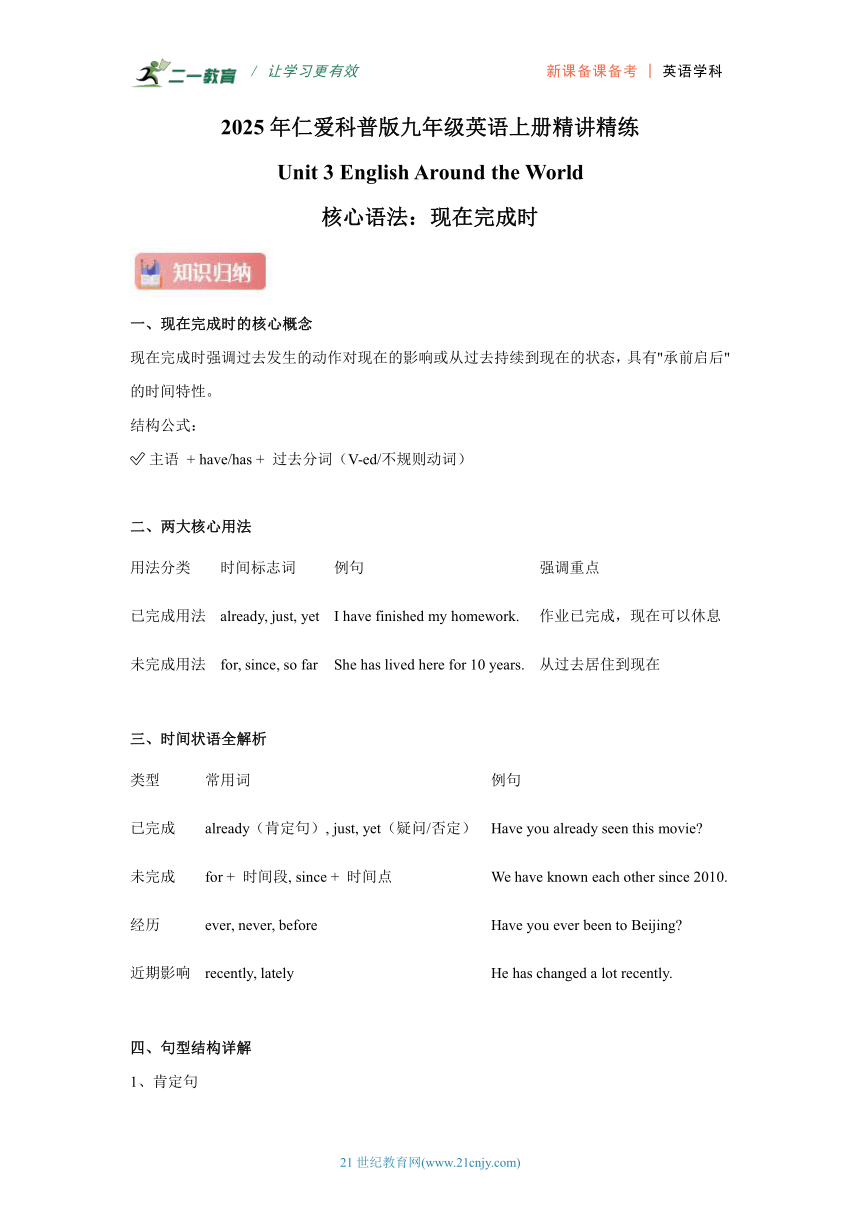
|
|
| 格式 | docx | ||
| 文件大小 | 73.1KB | ||
| 资源类型 | 试卷 | ||
| 版本资源 | 仁爱科普版 | ||
| 科目 | 英语 | ||
| 更新时间 | 2025-07-17 10:42:32 | ||
图片预览

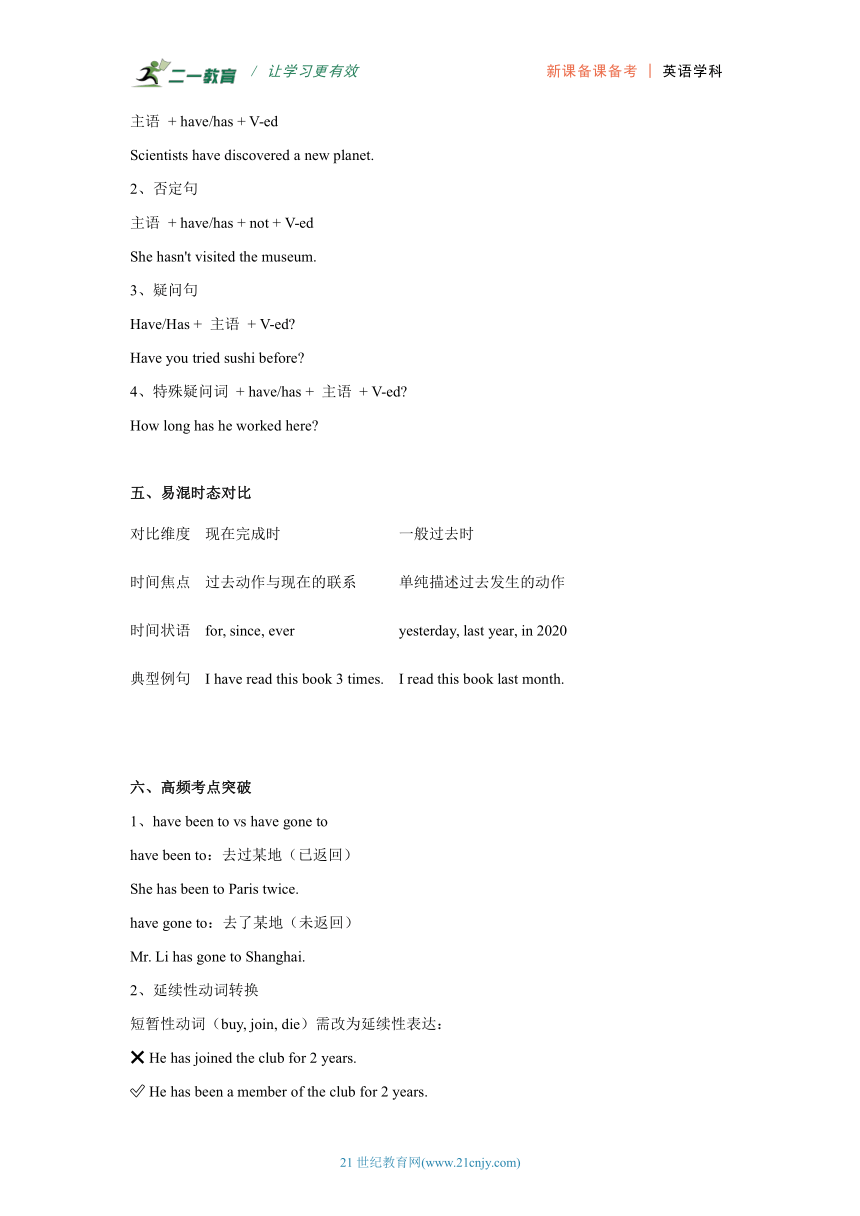
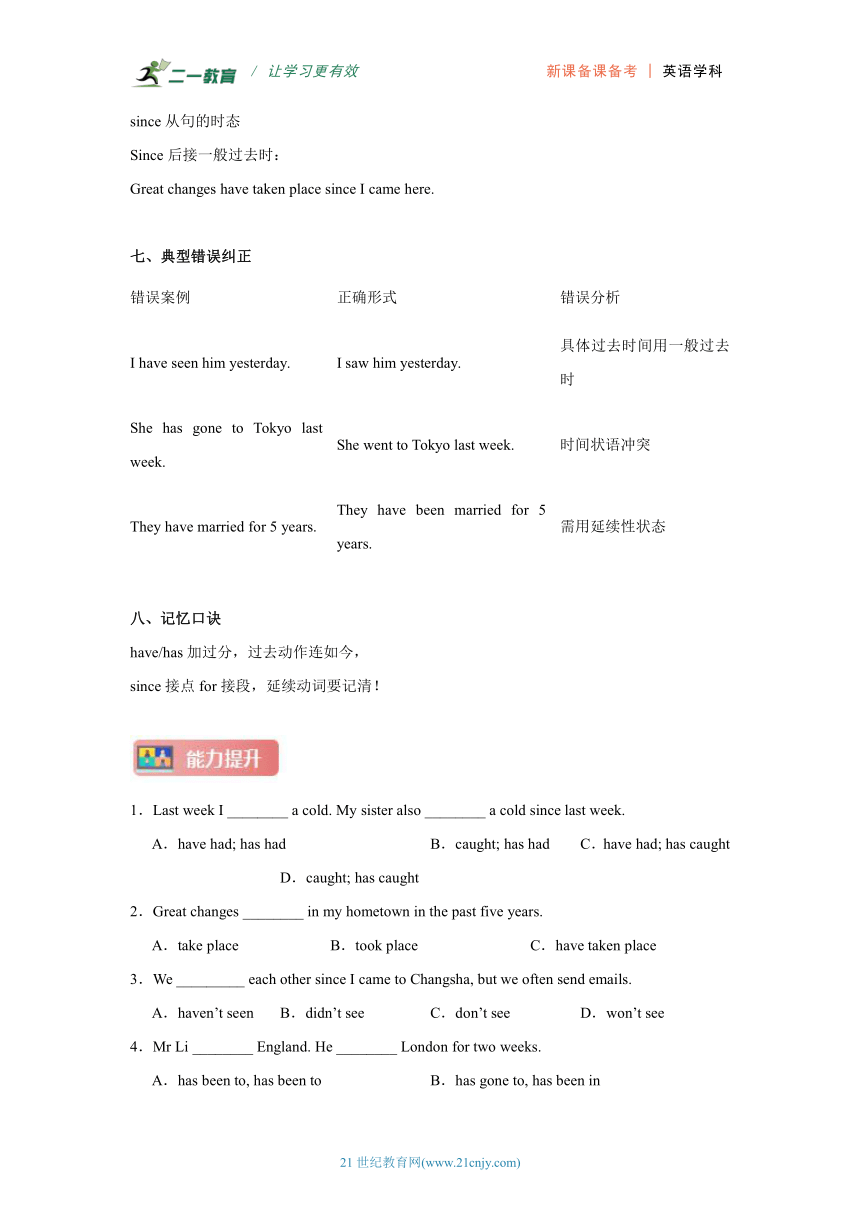
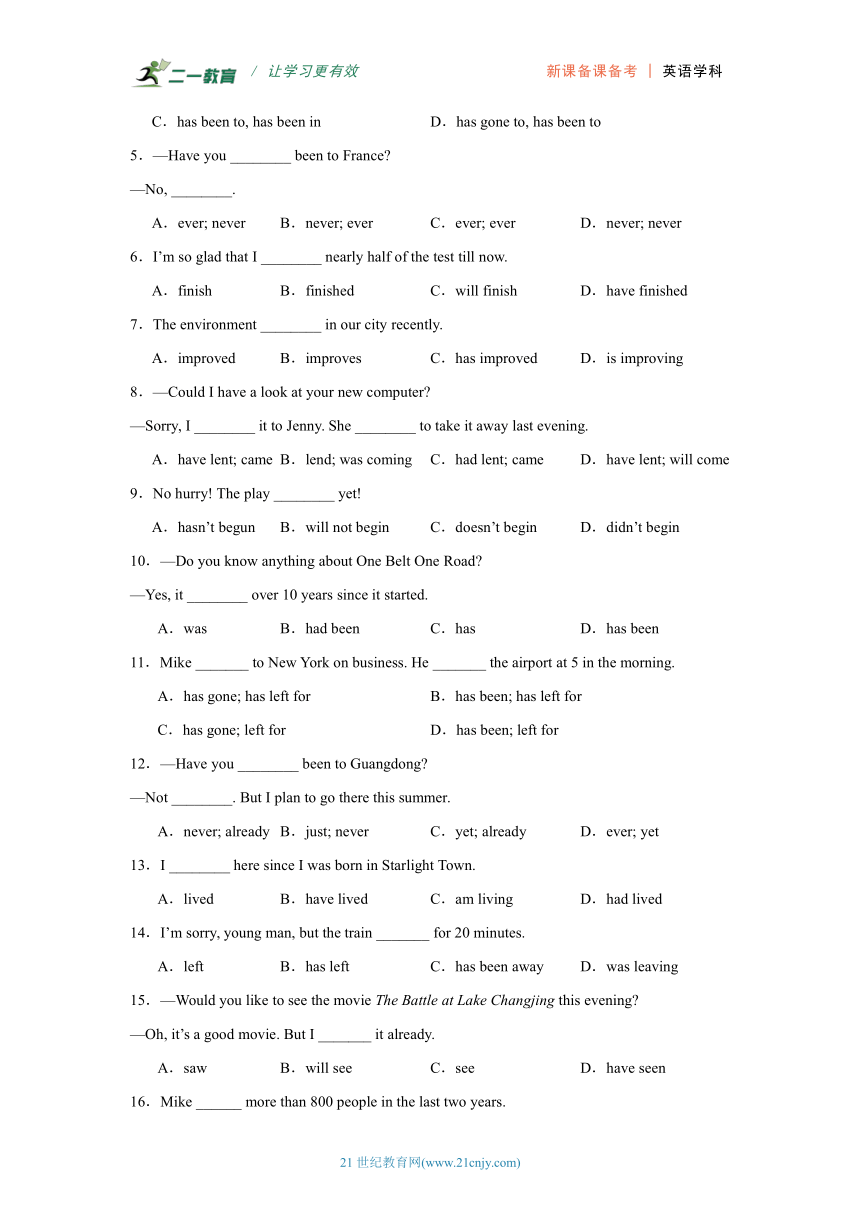
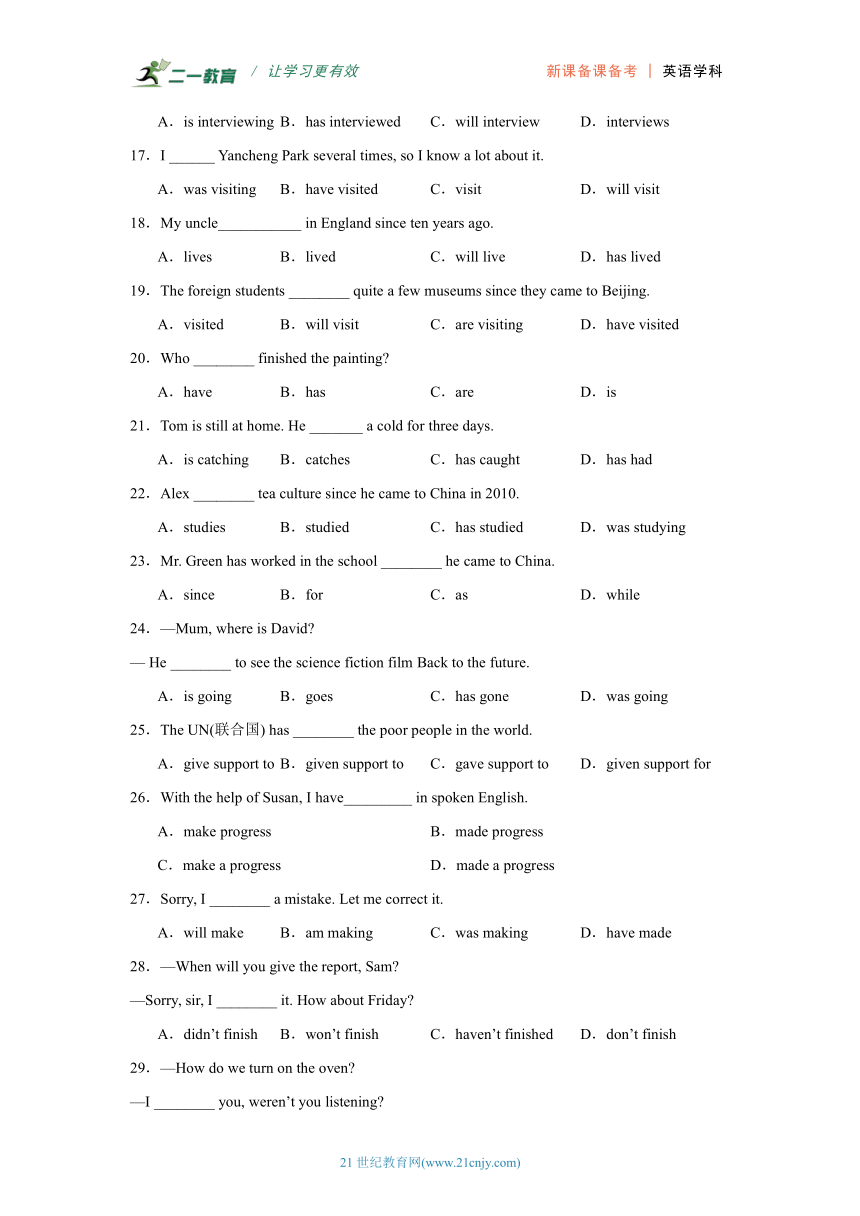
文档简介
/ 让学习更有效 新课备课备考 | 英语学科
/ 让学习更有效 新课备课备考 | 英语学科
2025年仁爱科普版九年级英语上册精讲精练
Unit 3 English Around the World
核心语法:现在完成时
一、现在完成时的核心概念
现在完成时强调过去发生的动作对现在的影响或从过去持续到现在的状态,具有"承前启后"的时间特性。
结构公式:
主语 + have/has + 过去分词(V-ed/不规则动词)
二、两大核心用法
用法分类 时间标志词 例句 强调重点
已完成用法 already, just, yet I have finished my homework. 作业已完成,现在可以休息
未完成用法 for, since, so far She has lived here for 10 years. 从过去居住到现在
三、时间状语全解析
类型 常用词 例句
已完成 already(肯定句), just, yet(疑问/否定) Have you already seen this movie
未完成 for + 时间段, since + 时间点 We have known each other since 2010.
经历 ever, never, before Have you ever been to Beijing
近期影响 recently, lately He has changed a lot recently.
四、句型结构详解
1、肯定句
主语 + have/has + V-ed
Scientists have discovered a new planet.
2、否定句
主语 + have/has + not + V-ed
She hasn't visited the museum.
3、疑问句
Have/Has + 主语 + V-ed
Have you tried sushi before
4、特殊疑问词 + have/has + 主语 + V-ed
How long has he worked here
五、易混时态对比
对比维度 现在完成时 一般过去时
时间焦点 过去动作与现在的联系 单纯描述过去发生的动作
时间状语 for, since, ever yesterday, last year, in 2020
典型例句 I have read this book 3 times. I read this book last month.
六、高频考点突破
1、have been to vs have gone to
have been to:去过某地(已返回)
She has been to Paris twice.
have gone to:去了某地(未返回)
Mr. Li has gone to Shanghai.
2、延续性动词转换
短暂性动词(buy, join, die)需改为延续性表达:
He has joined the club for 2 years.
He has been a member of the club for 2 years.
since从句的时态
Since后接一般过去时:
Great changes have taken place since I came here.
七、典型错误纠正
错误案例 正确形式 错误分析
I have seen him yesterday. I saw him yesterday. 具体过去时间用一般过去时
She has gone to Tokyo last week. She went to Tokyo last week. 时间状语冲突
They have married for 5 years. They have been married for 5 years. 需用延续性状态
八、记忆口诀
have/has加过分,过去动作连如今,
since接点for接段,延续动词要记清!
1.Last week I ________ a cold. My sister also ________ a cold since last week.
A.have had; has had B.caught; has had C.have had; has caught D.caught; has caught
2.Great changes ________ in my hometown in the past five years.
A.take place B.took place C.have taken place
3.We _________ each other since I came to Changsha, but we often send emails.
A.haven’t seen B.didn’t see C.don’t see D.won’t see
4.Mr Li ________ England. He ________ London for two weeks.
A.has been to, has been to B.has gone to, has been in
C.has been to, has been in D.has gone to, has been to
5.—Have you ________ been to France
—No, ________.
A.ever; never B.never; ever C.ever; ever D.never; never
6.I’m so glad that I ________ nearly half of the test till now.
A.finish B.finished C.will finish D.have finished
7.The environment ________ in our city recently.
A.improved B.improves C.has improved D.is improving
8.—Could I have a look at your new computer
—Sorry, I ________ it to Jenny. She ________ to take it away last evening.
A.have lent; came B.lend; was coming C.had lent; came D.have lent; will come
9.No hurry! The play ________ yet!
A.hasn’t begun B.will not begin C.doesn’t begin D.didn’t begin
10.—Do you know anything about One Belt One Road
—Yes, it ________ over 10 years since it started.
A.was B.had been C.has D.has been
11.Mike _______ to New York on business. He _______ the airport at 5 in the morning.
A.has gone; has left for B.has been; has left for
C.has gone; left for D.has been; left for
12.—Have you ________ been to Guangdong
—Not ________. But I plan to go there this summer.
A.never; already B.just; never C.yet; already D.ever; yet
13.I ________ here since I was born in Starlight Town.
A.lived B.have lived C.am living D.had lived
14.I’m sorry, young man, but the train _______ for 20 minutes.
A.left B.has left C.has been away D.was leaving
15.—Would you like to see the movie The Battle at Lake Changjing this evening
—Oh, it’s a good movie. But I _______ it already.
A.saw B.will see C.see D.have seen
16.Mike ______ more than 800 people in the last two years.
A.is interviewing B.has interviewed C.will interview D.interviews
17.I ______ Yancheng Park several times, so I know a lot about it.
A.was visiting B.have visited C.visit D.will visit
18.My uncle___________ in England since ten years ago.
A.lives B.lived C.will live D.has lived
19.The foreign students ________ quite a few museums since they came to Beijing.
A.visited B.will visit C.are visiting D.have visited
20.Who ________ finished the painting
A.have B.has C.are D.is
21.Tom is still at home. He _______ a cold for three days.
A.is catching B.catches C.has caught D.has had
22.Alex ________ tea culture since he came to China in 2010.
A.studies B.studied C.has studied D.was studying
23.Mr. Green has worked in the school ________ he came to China.
A.since B.for C.as D.while
24.—Mum, where is David
— He ________ to see the science fiction film Back to the future.
A.is going B.goes C.has gone D.was going
25.The UN(联合国) has ________ the poor people in the world.
A.give support to B.given support to C.gave support to D.given support for
26.With the help of Susan, I have_________ in spoken English.
A.make progress B.made progress
C.make a progress D.made a progress
27.Sorry, I ________ a mistake. Let me correct it.
A.will make B.am making C.was making D.have made
28.—When will you give the report, Sam
—Sorry, sir, I ________ it. How about Friday
A.didn’t finish B.won’t finish C.haven’t finished D.don’t finish
29.—How do we turn on the oven
—I ________ you, weren’t you listening
A.tell B.am telling C.will tell D.have told
30.—I ________ to the beautiful beach in Hainan.
—That’s wonderful. But I ________ there.
A.have gone; have never gone B.have been; have never been
C.have been; have never gone D.have gone; have never been
31.________ you ever ________ of dabbawalas in India
A.Did; hear B.Will; hear C.Have; heard D.Do; hear
32.—Have you __________ watched talk shows
—Yes, I really enjoy them.
A.ever B.still C.yet D.never
33.David has worked here for 10 years since he ________ from university.
A.graduates B.graduated C.has graduated D.will graduate
34.—________ you ________ to Japan
—No, not yet.
A.Did…go B.Are…going C.Have…been D.Have…gone
35.—My aunt _________ Singapore to spend her holiday.
—It’s a beautiful country. I _________ there twice.
A.has gone to; have gone B.has been to: have been
C.has gone to; have been to D.has gone to; have been
36.—Is this your camera
—Yes. I it for two weeks.
A.bought B.had C.have had
37.Neither my sister nor I ________ been to Xizang before.
A.have never B.has never C.have ever D.has ever
38.—How long ________ you ________ a fever
—Ever since last night.
A.have; got B.have; had C.have; caught D.did; have
39.It ________ five years since my brother joined the army.
A.be B.was C.has been D.is being
40.China ________ its best to improve the air quality in the last three years.
A.tried B.has tried C.had tried D.will try
41.Miss Green isn’t in the office. She ________ to the library.
A.has gone B.went C.will go D.has been
42.—Amy, can we give away these soft toys We ________ them for many years.
—Mom, but I want to keep the bear.
A.bought B.had C.have bought D.have had
43.—_________ you ________ these young trees
—Not yet.
A.Did; water B.Have; watered C.Are; watering D.Do; water
44.—What a beautiful bike! How long have you ________ it
—For just three days.
A.bought B.had C.received D.hired
45.Great changes __________ in our hometown in the past ten years.
A.have taken place B.have been taken place C.were taken place D.took place
46.— Would you like to see the film Zootopia with us
— I’d love to! But I ________ it.
A.saw B.see C.will see D.have seen
47.Great changes ________ in China in recent years.
A.have been taken place B.have been happened
C.taken place D.have taken place
48.—Look! The light is still on in Helen’s office.
—Maybe she _______ her work yet.
A.doesn’t finish B.won’t finish C.hasn’t finished D.didn’t finish
49.— I saw Mr. Li in his office just now.
— No, it ______ be him. He has ______ Guangzhou and will be back in two days.
A.mustn’t;gone to B.mustn’t;been to C.can’t;been to D.can’t;gone to
50.Amy ________ to the party. She had a wonderful time with us.
A.invites B.is invited C.was invited D.has invited
51.—This is a really old bike.
—Yes, I _________it for seven years.
A.have had B.have bought C.bought D.had bought
52.We ________ five lessons since the beginning of this term.
A.have learned B.learnt C.learn D.will learn
53.My father _____________ in the factory since he moved to Beijing.
A.works B.has worked C.is working D.worked
54.—Have you bought a birthday cake for your sister
—________. I will go to buy one right now.
A.No, I didn't B.No, I haven't C.Yes, I have D.Yes, I did
55.I ________ a book from the library last month. I have to return it today because I ________ it for too long.
A.borrowed; have borrowed B.borrowed; have kept
C.lent; have lent D.lent; have kept
56.Jimmy has been ________ for a year. His ________ has made his wife give up hope of life.
A.died, death B.dead, death C.died, dead D.dead, deads
57.—How is your reading project
—I ________ most of the books we are supposed to read since September.
A.have read B.read C.will read D.am reading
58.—I saw Kangkang playing basketball on the playground just now.
—It can’t be him. He ________ America for further study.
A.has gone to B.has been in C.has been to D.went
59.William ________ six books, and all of them are bestsellers.
A.will write B.is writing C.has written D.was writing
60.So far, we ________ to sing five English songs this term.
A.learned B.have learned C.are learning D.will learn
61.I am very hungry. I _________ breakfast yet.
A.haven’t had B.don’t have C.didn’t have
62.He’s never won the game, ________ he
A.is B.has C.isn’t D.hasn’t
63.―________ you ________ the movie Furious 7 yet
—Yes, I ________ it last night. It’s wonderful.
A.Did; see; saw B.Did; see; have seen
C.Have; seen; have seen D.Have; seen; saw
64.—When did your uncle begin to work in the school
—He has worked here _______ he moved to the city.
A.since B.while C.until
65.Though he ________ the book four times, he hopes to read it again.
A.read B.reads C.has read
66.—I want to borrow the book but I don’t know how long it may ________.
—For two weeks.
A.keep B.be borrowed C.borrow D.be kept
67.—Why can’t you buy the railway ticket now
—-Because I ________my ID card at my home.
A.left B.have left C.will left D.leave
68.Not all the students in my class would like to go to Suzhou Museum next week because about three-fifths of them _________ there before.
A.have been B.have gone C.has been D.have been to
69.His grandmother for 6 years. And he still misses her very much.
A.died B.has died C.has been dead D.has been died
70.—Do you know where Tom is
—Yes. He ________ his hometown.
A.went to B.goes to C.has gone to D.has been to
/ 让学习更有效 新课备课备考 | 英语学科
/ 让学习更有效 新课备课备考 | 英语学科
21世纪教育网(www.21cnjy.com)
21世纪教育网(www.21cnjy.com)
参考答案及试题解析
1.B
【解析】句意:上周我感冒了。我姐姐从上周开始也感冒了。
考查动词时态辨析。have a cold和catch a cold都表示“感冒”,但前者强调状态,后者强调动作。第一空根据时间状语“Last week”可知,感冒这一动作发生在上周,所以用一般过去时caught;第二空根据时间状语“since last week”可知,感冒这一状态从上周开始一直持续到现在,所以用现在完成时has had。综合两个空的情况,只有B选项符合题意。故选B。
2.C
【解析】句意:在过去的五年里我的家乡发生了巨大的变化。
考查现在完成时。根据“in the past five years”可知句子要用现在完成时,其谓语动词结构为“have/has+动词的过去分词”,主语Great changes为复数,助动词要用have,C选项符合该结构。故选C。
3.A
【解析】句意:自从我来到长沙我们就没见过面,但我们经常发邮件。
考查现在完成时。根据“since I came to Changsha”可知,主句时态为现在完成时,其谓语动词结构为“have/has+动词的过去分词”,A选项符合该结构。故选A。
4.B
【解析】句意:李先生去了英国。他已经在伦敦待了两周了。
考查现在完成时的用法。has been to去过某地,现在已经回来了,强调过去的经历;has gone to去了某地,还没有回来,强调现在人不在说话地点;has been in在某地待了多长时间,常与一段时间连用。 根据“Mr Li…England. He…London for two weeks.”可知,第一个空,这里说李先生去了英国,人还没回来,应该用has gone to;第二个空,后面有for two weeks表示一段时间,说明他在伦敦待了两周了,要用has been in。故选B。
5.A
【解析】句意:——你曾经去过法国吗?——没有,从来没有。
考查副词。ever曾经,常与现在完成时连用,表示某个动作或状态是否曾经发生过;never从未。分析句子可知,第一空表示“曾经”;第二空表示“从未去过”。故选A。
6.D
【解析】句意:我很高兴到现在为止我已经完成了将近一半的测试。
考查时态。根据“I’m so glad that I…nearly half of the test till now.”可知,句中有时间状语till now,强调从过去开始到现在这个时间段里完成了将近一半的测试,这种过去发生的动作对现在造成了影响,所以句子时态应该用现在完成时。故选D。
7.C
【解析】句意:我们城市的环境最近已经改善了。
考查动词时态辨析。improved改善,一般过去时;improves改善,一般现在时第三人称单数形式;has improved已经改善,现在完成时;is improving正在改善,现在进行时。根据时间状语“recently”可知,句子应用现在完成时,表示过去发生的动作对现在造成的影响或结果,即环境在过去的一段时间内得到了改善,并且这种改善对现在仍有影响。因此,应该用“has improved”。故选C。
8.A
【解析】句意:——我可以看一下你的新电脑吗?——对不起,我把它借给珍妮了。她昨晚来把它拿走了。
考查动词时态。have lent现在完成时,已经借出;lend一般现在时,借出;had lent过去完成时,已经借出。came一般过去时,来;was coming过去进行时,正在来;will come一般将来时,将会来。分析第一处可知,此处强调“已经借出”,且对现在产生了影响,即“我不能给你看”,所以此处使用现在完成时,排除B和C。分析第二处及“last evening”可知,此处强调动作发生在过去,所以使用一般过去时,排除D。故选A。
9.A
【解析】句意:别着急!演出还没有开始!
考查动词时态辨析。hasn’t begun现在完成时的否定形式;will not begin一般将来时的否定形式;doesn’t begin一般现在时的否定形式;didn’t begin一般过去时的否定形式。根据“No hurry!”可知,此处表示演出还没有开始,强调对现在的影响,即“别着急”,因此应该用现在完成时的否定形式。故选A。
10.D
【解析】句意:——你知道“一带一路”吗?——知道,从开始到现在已经有10多年了。
考查现在完成时。根据“it ... over 10 years since it started”可知,此处强调时间的延续,是“现在完成时+since+一般过去时”结构,故选D。
11.C
【解析】句意:麦克已经去了纽约出差。他早上5点就出发去了机场。
考查现在完成时和一般过去时的用法。第一空表示麦克已经去了纽约,且现在仍在纽约,用has gone,表示去了没回来;第二空表示他早上5点出发去机场,是一个过去的动作,用一般过去时态,动词用left for。故选C。
12.D
【解析】句意:——你去过广东吗?——还没有。我计划这个暑假去那里。
考查副词辨析。never从未;already已经;just刚刚;yet仍然,还;ever曾经。根据“Have you...been to Guangdong ”可知,此处指是否曾去过广东,一般疑问句中用ever;根据“Not...But I plan to go there this summer.”可知,此处表示“没去过”,not yet“还没有”,故选D。
13.B
【解析】句意:自从我出生在星光镇以来,我就一直住在这里。
考查动词时态。根据“since I was born in Starlight Town”可知,此处用现在完成时态,其结构为“have/has + done”。故选B。
14.C
【解析】句意:对不起,年轻人,火车已经开走20分钟了。
考查现在完成时。根据“for 20 minutes”可知,时态为现在完成时“have/has+done”,表示持续了一段时间,主语为the train,用延续性动词短语be away的现在完成时结构“has been away”。故选C。
15.D
【解析】句意:——今晚你想看电影《长津湖》吗?——哦,那是一部好电影。但是我已经看过了。
考查时态。根据“already”可知此处表示过去的动作对现在的影响,使用现在完成时have/has done。故选D。
16.B
【解析】句意:迈克在过去的两年中已经采访了800多人。
考查时态。根据时间状语“in the last two years”可知此处用现在完成时have/has done,故选B。
17.B
【解析】句意:我已经参观过盐城公园好几次了,所以我对它了解很多。
考查现在完成时。根据句中的“several times”可知,表示过去的动作对现在的影响,应用现在完成时have/has done的结构。故选B。
18.D
【解析】句意:自从十年前我的叔叔就住在英国。
考查动词的时态。根据“since ten years ago”可知讲述的是动作过去开始延续到现在的状态,句子是现在完成时,动词用“has lived”。故选D。
19.D
【解析】句意:这些外国学生自从来到北京已经参观了好几家博物馆。
考查现在完成时态。根据“since they came to Beijing”可知,此处描述从过去某个时间到现在发生的事情,用现在完成时态,基本结构是have/has+动词过去分词。The foreign students作主语,助动词选用have,故选D。
20.B
【解析】句意:谁完成了这幅画?
考查助动词。have助动词,构成现在完成时;has助动词,have的第三人称单数;are是,be动词,用于第二人称单复数现在时和第一、三人称复数现在时;is是,be动词三单形式。根据句意文判断,本句是主动语态;who疑问代词,是单数第三人称。故选B。
21.D
【解析】句意:Tom还在家。他感冒已经三天了。
考查现在完成时。根据“for three days”可知,用现在完成时“have/has+done”;“感冒好几天了”为持续性动作,所以要用has had。故选D。
22.C
【解析】句意:Alex自从2010年来到中国开始研究茶文化。
考查现在完成时。根据“Alex ... tea culture since he came to China in 2010.”可知,强调时间的延续,是“现在完成时+since+一般过去时”结构,此处用现在完成时have/has done,故选C。
23.A
【解析】句意:格林先生自从来到中国以来就在这所学校工作。
考查连词辨析。since自从;for因为;as由于;while当……时。根据“has worked”及“he came to China”可知,since+一般过去时的句子,主句用现在完成时,故选A。
24.C
【解析】句意:——妈妈,大卫在哪?——他去看科幻电影《回到未来》了。
考查动词时态。大卫“看电影”的动作发生在过去,并且对上文两人之间的对话产生影响,故为现在完成时态,结构是have/has done。故选C。
25.B
【解析】句意:联合国已经向世界上的穷人提供了援助。
考查动词词组及动词的过去分词。根据助动词“has”可知,后面应该用动词的过去分词形式。give的过去分词应该是given。“给……提供支持”应该用give support to sb。故选B。
26.B
【解析】句意:在苏珊的帮助下,我在英语口语方面取得了进步。
考查现在完成时和动词短语辨析。“progress”是不可数名词,单词前不能加冠词a,make progress表示“取得进步”;又根据“have”可知”,本题是现在完成时,因此make要用过去分词made,故选B。
27.D
【解析】句意:对不起,我弄错了。我来纠正一下。
考查现在完成时。根据“Sorry, I...a mistake. Let me correct it.”可知,因为已经犯了错误,所以现在要去纠正,故选D。
28.C
【解析】句意:——萨姆,你什么时候交报告?——对不起,先生,我还没写完。星期五交怎么样?
考查动词时态。根据“How about Friday ”可知报告还在写,但是没有完成,应用现在完成时。故选C。
29.D
【解析】句意:——我们怎么打开烤箱?——我已经告诉过你,你当时没在听吗?
考查动词时态。根据“How do we turn on the oven”及“weren’t you listening”可知,表示过去已经完成的动作对现在造成的影响,用现在完成时have/has done的结构,故选D。
30.B
【解析】句意:——我去过海南美丽的海滩。——太棒了。但我从未去过那里。
考查现在完成时。have been to表示“去过某地,现在已经回来”,have gone to表示“去了某地,现在还没有回来”。根据“That’s wonderful.”可知,第一个空用have been to,说明已经回来了;第二个空“我从未去过那里”,用have never been。故选B。
31.C
【解析】句意:你曾经听说过印度的达巴瓦拉吗?
考查现在完成时。根据语境可知,此处是在询问对方是否曾经听说过印度的达巴瓦拉,ever常用于现在完成时中,表示曾经。所以此处应该用have heard。故选C。
32.A
【解析】句意:——你看过脱口秀吗?——是的,我很喜欢。
考查副词辨析。ever曾经;still仍然;yet还;never从不。根据“Have you...watched talk shows ”可知,此处用在一般疑问句中,表示“曾经”,故选A。
33.B
【解析】句意:大卫大学毕业后在这里工作了10年。
考查动词时态。since引导的时间状语从句,主句用现在完成时,从句用一般过去时,毕业的动作已经发生过,故选B。
34.C
【解析】句意:——你去过日本吗?——不,还没有。
考查时态。根据yet可知,此处用现在完成时,have been to去过,去了又回来了。have gone to去了,还没有回来。询问他是否去过日本,因此用have been to。故选C。
35.D
【解析】句意:——我阿姨去新加坡度假了。 ——这是一个美丽的国家。我去过那里两次。
考查动词时态。has gone (to) 去过某地,表示去了还没有回来;has been (to) 去过某地,表示去了已经回来。第一空,根据“My aunt...Singapore to spend her holiday.”可知,此处表示阿姨去新加坡度假了,还没有回来,用has gone to;第二空,根据“I...there twice.”可知,此处表示去过新加坡两次,去了已经回来了,且there是地点副词,前面不能加to,所以第二空用have been。故选D。
36.C
【解析】句意:——这是你的照相机吗?——是的,我已经买了两个星期了。
考查现在完成时。根据句中“for two weeks”可知,该句应用现在完成时,所以排除选项 A 和 B;又因为动词buy是短暂性动词,在现在完成时中,短暂性动词不能够与一段时间连用,需要转换成相对应的延续性动词 have,故选C。
37.C
【解析】句意:我和妹妹以前都没有去过西藏。
考查现在完成时。have never从来不;has never从来不(has为have的第三人称单数);have ever曾经;has ever曾经(has为have的第三人称单数)。根据“been to”和“before”可知本句应用现在完成时“have/has done”,又因“Neither my sister nor I”中neither...nor表示“两者都不”,本身为否定意义,谓语遵循“就近一致”原则,因离其最近的主语是I,动词用原形。故选C。
38.B
【解析】句意:——你发烧多长时间了?——从昨晚开始。
考查现在完成时和延续性动词。get a fever发烧,是瞬间性动词;have a fever发烧,是延续性动词;catch a fever发烧,是瞬间性动词。根据“Ever since last night.”可知,此处用现在完成时,与时间段连用,谓语动词用延续性动词,故选B。
39.C
【解析】句意:我哥哥参军已经五年了。
考查时态。此处是“It is/has been+时间段+since从句”的句型,主句应用一般现在时或现在完成时,故选C。
40.B
【解析】句意:在过去三年中,中国已尽最大努力改善空气质量。
考查动词时态。根据“in the last three years”可知,此处使用现在完成时,结构为have/has done。故选B。
41.A
【解析】句意:格林小姐不在办公室。她去图书馆了。
考查现在完成时。have gone to去了某地(还未回来);have been go去过某地(已经回来)。根据“Miss Green isn’t in the office.”可知,格林小姐不在办公室,说明她去图书馆了,还未回来,应用have gone to;主语为“She”,助动词用has。故选A。
42.D
【解析】句意:——Amy,我们能把这些玩具捐赠出去吗?我们已经买了很多年了。——妈妈,但是我想留着这个熊。
考查现在完成时态。根据“for many years”可知,应用现在完成时态,又buy为短暂性动词,应转换为延续性动词have。故选D。
43.B
【解析】句意:——你给这些小树浇水了吗?——还没有。
考查时态。根据“Not yet”可知此处表示过去的动作对现在的影响,用现在完成时have/has done。故选B。
44.B
【解析】句意:——好漂亮的自行车!你买了多久了?——就三天。
考查延续性动词。bought买;had拥有;received收到;hired雇用。根据“For just three days.”及“How long”可知,此处应用延续性动词,选项中had为延续性动词,表示“你买了自行车多久了”。故选B。
45.A
【解析】句意:在过去的十年里,我们的家乡发生了巨大的变化。
考查动词短语和时态。take place“发生”,不用于被动语态,排除BC选项;再根据“in the past ten years”可知,时态要用现在完成时,结构为have done;“Great changes”作主语,助动词用have;take的过去分词为taken。故选A。
46.D
【解析】句意:——你想和我们一起去看电影《疯狂动物城》吗?——我想去!但我已经看过了。
考查现在完成时态。答语表示已经看过这部电影了,强调已经完成的动作,要用现在完成时have/has done的结构。故选D。
47.D
【解析】句意:最近几年,中国发生了巨大的变化。
考查时态。根据“in recent years”可知,句子要用在现在完成时,排除C;take place/happen“发生”,无被动语态;故选D。
48.C
【解析】句意:——看!海伦办公室的灯还亮着。——也许她还没完成工作。
考查动词时态。根据“yet”可知句子时态是现在完成时:have/has+done,故选C。
49.D
【解析】句意:——我刚才看见李先生在他的办公室里。 ——不,不可能是他。他去了广州,两天后回来。
考查情态动词和现在完成时。mustn’t禁止;can’t不可能;have been to意为“曾经去过某地”,表示现在已不在那里了;have gone to意为“已经去了某地”,说话时此人还没回来。根据下文“He has gone to Guangzhou”可知,此处表否定推测,A、B选项可排除。根据下文“will be back in two days”可知,李先生还在广州没有回来,故第二空应用gone to。故选D。
50.C
【解析】句意:艾米被邀请去聚会。她和我们玩得很开心。
考查一般过去时的被动语态。根据“She had a wonderful time with us”可知应用一般过去时,而主语Amy和谓语动词invite“邀请”之间是逻辑上的动宾关系,应用被动语态,一般过去时的被动语态的谓语结构为“was/were+done”,故选C。
51.A
【解析】句意:——这是一辆非常旧的自行车。——是的,我已经买了7年了。
考查现在完成时。have had已经拥有多长时间了,现在完成时;have bought买,现在完成时;bought买,过去式。根据“for seven years”,可知本句应该用现在完成时,其构成为“have/has done”,buy是瞬间动词,在现在完成时中不能和时间段连用,所以用have“拥有”,其过去分词为“had”。故选A。
52.A
【解析】句意:自从这个学期开始,我们已经学了五课。
考查动词时态。根据“since the beginning of this term”可知,时态应用现在完成时。故选A。
53.B
【解析】句意:我父亲搬到北京后一直在这家工厂工作。
考查现在完成时。根据“since he moved to Beijing.”可知,句子的时态是现在完成时,其结构是“have/has done”,B选项符合题意。故选B。
54.B
【解析】句意:——你给你妹妹买生日蛋糕了吗?——没有,我现在就去买一个。
考查一般疑问句回答。根据“I will go to buy one right now.”可知,此处应用否定回答,排除C/D选项;而问句用的是现在完成时,回答也用现在完成时,故选B。
55.B
【解析】句意:我上个月从图书馆借了一本书。我今天必须归还它,因为我已经借了太长时间。
考查动词的时态以及短暂性动词和延续性动词的用法。第一空根据last month可知用一般过去时,“borrow sth from...”表示“从……借某物”,lend是“借给”,所以第一空用borrowed;第二空for too long表示一段时间,borrow是短暂性动词,不能与一段时间连用,要转化为keep,其过去分词是kept,这里用现在完成时have kept。故选B。
56.B
【解析】句意:Jimmy已经去世一年了。他的死亡让妻子对生活失去了希望。
考查动词、形容词、名词辨析。died死亡,动词过去式;dead死亡的,形容词;death死亡,名词。根据“has been...”可知,第一空填形容词dead,表示“已死亡的”;died为短暂性动词,不与for连用;形容词性物主代词his后修饰名词,故第二个空填death。故选B。
57.A
【解析】句意:——你的阅读计划怎么样了?——从九月份开始,我们应该读的书我读了大部分了。
考查动词时态。since+过去的时间点,句子用现在完成时have/has done的结构,故选A。
58.A
【解析】句意:——刚才我看见康康在操场上打篮球。——不可能是他。他去美国深造去了。
考查动词短语和时态。has gone to去了某地(还未回);has been in待在某地;has been to曾经去过(某地);went去。根据“It can’t be him. ”可知,应是去了美国还未回来,强调过去发生的动作对现在造成的影响和结果。故选A。
59.C
【解析】句意:威廉写了六本书,都是畅销书。
考查现在完成时。根据“William…six books, and all of them are bestsellers.”可知,此处强调动作已经完成,用现在完成时,故选C。
60.B
【解析】句意:迄今为止,这学期我们已经学会唱五首英文歌曲。
考查时态。learn“学习”,时间状语so far与现在完成时连用,故选B。
61.A
【解析】句意:我很饿。我还没吃早饭呢。
考查动词时态。根据“yet”可知,此处用现在完成时“have/has done”,表示否定应在助动词have/has后加not,故选A。
62.B
【解析】句意:他没有赢得这次比赛,是吗?
考查反意疑问句。根据“He’s never won the game”可知,句子使用现在完成时,即have/has+动词的过去分词;故排除A和C;never是否定词,所以反意疑问句使用肯定形式,故选B。
63.D
【解析】句意:——你看电影《速度与激情7》了吗?——看了,我昨晚看的。它很精彩。
考查现在完成时和一般过去时。问句中出现了“yet”,所以应该用现在完成时态,排除AB项;答语中出现了“last night”这个过去的时间点,所以应该用一般过去时态,综合可知正确答案为D。故选D。
64.A
【解析】句意:——你叔叔什么时候开始在学校工作的?——自从他搬到这个城市,他就一直在这里工作。
考查连词辨析。since自从;while与……同时;until直到。根据“He has worked here ... he moved to the city.”可知,自从他搬到这个城市,他就一直在这里工作;since符合语境,引导的时间状语从句用一般过去时,主句用现在完成时。故选A。
65.C
【解析】句意:虽然这本书他已经读了四遍,但他希望再读一遍。
考查时态。根据“ he hopes to read it again.”可知,这本书他已经看了四次,用现在完成时。故选C。
66.D
【解析】句意:——我想要借那本书,但是我不知道可以保留它多长时间。——为期两周。
考查动词时态和语态。keep保留,延续性动词;be borrowed被借用;borrow借用,短暂性动词;be kept被保留。根据“how long”可知,与时间段连用,用延续性动词keep;且主语it与谓语keep之间是被动关系,因此用被动语态be kept。故选D。
67.B
【解析】句意:——你为什么现在不能买火车票?——因为我把身份证忘在家里了。
考查动词时态辨析。根据“I...my ID card at my home.”可知,leave这个动作对现在造成了不能买火车票的影响,需用“have/has done”现在完成时结构,故选B。
68.A
【解析】句意:不是班里所有的学生下周都想去苏州博物馆,因为他们中大约五分之三以前去过那里。
考查主谓一致以及地点副词用法。根据语境可知,此处指的是有五分之三的学生曾经去过那里,have been to意为“曾经去过某地”,现在已经不在那里了,B选项可排除。there为地点副词,前面不用介词,D选项可排除。three-fifths of后面接的是表复数概念的人称代词them,故应用have been,故选A。
69.C
【解析】句意:他的祖母已经去世6年。他仍然非常想念她。
考查时态。die死,是瞬间性动词;be dead死亡,是延续性动词形式;根据for 6 years可知,与时间段连用,用延续性动词的现在完成时,故选C。
70.C
【解析】句意:——你知道汤姆在哪儿吗? ——是的。他已经回老家了。
考查现在完成时。have/has gone to表示“已经去了某地还没回来”;have/has been to表示“已经去过某地现在已经回来了”。根据“He … his hometown.”可知,他到乡下去了,还没有回来。故选C。
21世纪教育网(www.21cnjy.com)
21世纪教育网(www.21cnjy.com)
/ 让学习更有效 新课备课备考 | 英语学科
2025年仁爱科普版九年级英语上册精讲精练
Unit 3 English Around the World
核心语法:现在完成时
一、现在完成时的核心概念
现在完成时强调过去发生的动作对现在的影响或从过去持续到现在的状态,具有"承前启后"的时间特性。
结构公式:
主语 + have/has + 过去分词(V-ed/不规则动词)
二、两大核心用法
用法分类 时间标志词 例句 强调重点
已完成用法 already, just, yet I have finished my homework. 作业已完成,现在可以休息
未完成用法 for, since, so far She has lived here for 10 years. 从过去居住到现在
三、时间状语全解析
类型 常用词 例句
已完成 already(肯定句), just, yet(疑问/否定) Have you already seen this movie
未完成 for + 时间段, since + 时间点 We have known each other since 2010.
经历 ever, never, before Have you ever been to Beijing
近期影响 recently, lately He has changed a lot recently.
四、句型结构详解
1、肯定句
主语 + have/has + V-ed
Scientists have discovered a new planet.
2、否定句
主语 + have/has + not + V-ed
She hasn't visited the museum.
3、疑问句
Have/Has + 主语 + V-ed
Have you tried sushi before
4、特殊疑问词 + have/has + 主语 + V-ed
How long has he worked here
五、易混时态对比
对比维度 现在完成时 一般过去时
时间焦点 过去动作与现在的联系 单纯描述过去发生的动作
时间状语 for, since, ever yesterday, last year, in 2020
典型例句 I have read this book 3 times. I read this book last month.
六、高频考点突破
1、have been to vs have gone to
have been to:去过某地(已返回)
She has been to Paris twice.
have gone to:去了某地(未返回)
Mr. Li has gone to Shanghai.
2、延续性动词转换
短暂性动词(buy, join, die)需改为延续性表达:
He has joined the club for 2 years.
He has been a member of the club for 2 years.
since从句的时态
Since后接一般过去时:
Great changes have taken place since I came here.
七、典型错误纠正
错误案例 正确形式 错误分析
I have seen him yesterday. I saw him yesterday. 具体过去时间用一般过去时
She has gone to Tokyo last week. She went to Tokyo last week. 时间状语冲突
They have married for 5 years. They have been married for 5 years. 需用延续性状态
八、记忆口诀
have/has加过分,过去动作连如今,
since接点for接段,延续动词要记清!
1.Last week I ________ a cold. My sister also ________ a cold since last week.
A.have had; has had B.caught; has had C.have had; has caught D.caught; has caught
2.Great changes ________ in my hometown in the past five years.
A.take place B.took place C.have taken place
3.We _________ each other since I came to Changsha, but we often send emails.
A.haven’t seen B.didn’t see C.don’t see D.won’t see
4.Mr Li ________ England. He ________ London for two weeks.
A.has been to, has been to B.has gone to, has been in
C.has been to, has been in D.has gone to, has been to
5.—Have you ________ been to France
—No, ________.
A.ever; never B.never; ever C.ever; ever D.never; never
6.I’m so glad that I ________ nearly half of the test till now.
A.finish B.finished C.will finish D.have finished
7.The environment ________ in our city recently.
A.improved B.improves C.has improved D.is improving
8.—Could I have a look at your new computer
—Sorry, I ________ it to Jenny. She ________ to take it away last evening.
A.have lent; came B.lend; was coming C.had lent; came D.have lent; will come
9.No hurry! The play ________ yet!
A.hasn’t begun B.will not begin C.doesn’t begin D.didn’t begin
10.—Do you know anything about One Belt One Road
—Yes, it ________ over 10 years since it started.
A.was B.had been C.has D.has been
11.Mike _______ to New York on business. He _______ the airport at 5 in the morning.
A.has gone; has left for B.has been; has left for
C.has gone; left for D.has been; left for
12.—Have you ________ been to Guangdong
—Not ________. But I plan to go there this summer.
A.never; already B.just; never C.yet; already D.ever; yet
13.I ________ here since I was born in Starlight Town.
A.lived B.have lived C.am living D.had lived
14.I’m sorry, young man, but the train _______ for 20 minutes.
A.left B.has left C.has been away D.was leaving
15.—Would you like to see the movie The Battle at Lake Changjing this evening
—Oh, it’s a good movie. But I _______ it already.
A.saw B.will see C.see D.have seen
16.Mike ______ more than 800 people in the last two years.
A.is interviewing B.has interviewed C.will interview D.interviews
17.I ______ Yancheng Park several times, so I know a lot about it.
A.was visiting B.have visited C.visit D.will visit
18.My uncle___________ in England since ten years ago.
A.lives B.lived C.will live D.has lived
19.The foreign students ________ quite a few museums since they came to Beijing.
A.visited B.will visit C.are visiting D.have visited
20.Who ________ finished the painting
A.have B.has C.are D.is
21.Tom is still at home. He _______ a cold for three days.
A.is catching B.catches C.has caught D.has had
22.Alex ________ tea culture since he came to China in 2010.
A.studies B.studied C.has studied D.was studying
23.Mr. Green has worked in the school ________ he came to China.
A.since B.for C.as D.while
24.—Mum, where is David
— He ________ to see the science fiction film Back to the future.
A.is going B.goes C.has gone D.was going
25.The UN(联合国) has ________ the poor people in the world.
A.give support to B.given support to C.gave support to D.given support for
26.With the help of Susan, I have_________ in spoken English.
A.make progress B.made progress
C.make a progress D.made a progress
27.Sorry, I ________ a mistake. Let me correct it.
A.will make B.am making C.was making D.have made
28.—When will you give the report, Sam
—Sorry, sir, I ________ it. How about Friday
A.didn’t finish B.won’t finish C.haven’t finished D.don’t finish
29.—How do we turn on the oven
—I ________ you, weren’t you listening
A.tell B.am telling C.will tell D.have told
30.—I ________ to the beautiful beach in Hainan.
—That’s wonderful. But I ________ there.
A.have gone; have never gone B.have been; have never been
C.have been; have never gone D.have gone; have never been
31.________ you ever ________ of dabbawalas in India
A.Did; hear B.Will; hear C.Have; heard D.Do; hear
32.—Have you __________ watched talk shows
—Yes, I really enjoy them.
A.ever B.still C.yet D.never
33.David has worked here for 10 years since he ________ from university.
A.graduates B.graduated C.has graduated D.will graduate
34.—________ you ________ to Japan
—No, not yet.
A.Did…go B.Are…going C.Have…been D.Have…gone
35.—My aunt _________ Singapore to spend her holiday.
—It’s a beautiful country. I _________ there twice.
A.has gone to; have gone B.has been to: have been
C.has gone to; have been to D.has gone to; have been
36.—Is this your camera
—Yes. I it for two weeks.
A.bought B.had C.have had
37.Neither my sister nor I ________ been to Xizang before.
A.have never B.has never C.have ever D.has ever
38.—How long ________ you ________ a fever
—Ever since last night.
A.have; got B.have; had C.have; caught D.did; have
39.It ________ five years since my brother joined the army.
A.be B.was C.has been D.is being
40.China ________ its best to improve the air quality in the last three years.
A.tried B.has tried C.had tried D.will try
41.Miss Green isn’t in the office. She ________ to the library.
A.has gone B.went C.will go D.has been
42.—Amy, can we give away these soft toys We ________ them for many years.
—Mom, but I want to keep the bear.
A.bought B.had C.have bought D.have had
43.—_________ you ________ these young trees
—Not yet.
A.Did; water B.Have; watered C.Are; watering D.Do; water
44.—What a beautiful bike! How long have you ________ it
—For just three days.
A.bought B.had C.received D.hired
45.Great changes __________ in our hometown in the past ten years.
A.have taken place B.have been taken place C.were taken place D.took place
46.— Would you like to see the film Zootopia with us
— I’d love to! But I ________ it.
A.saw B.see C.will see D.have seen
47.Great changes ________ in China in recent years.
A.have been taken place B.have been happened
C.taken place D.have taken place
48.—Look! The light is still on in Helen’s office.
—Maybe she _______ her work yet.
A.doesn’t finish B.won’t finish C.hasn’t finished D.didn’t finish
49.— I saw Mr. Li in his office just now.
— No, it ______ be him. He has ______ Guangzhou and will be back in two days.
A.mustn’t;gone to B.mustn’t;been to C.can’t;been to D.can’t;gone to
50.Amy ________ to the party. She had a wonderful time with us.
A.invites B.is invited C.was invited D.has invited
51.—This is a really old bike.
—Yes, I _________it for seven years.
A.have had B.have bought C.bought D.had bought
52.We ________ five lessons since the beginning of this term.
A.have learned B.learnt C.learn D.will learn
53.My father _____________ in the factory since he moved to Beijing.
A.works B.has worked C.is working D.worked
54.—Have you bought a birthday cake for your sister
—________. I will go to buy one right now.
A.No, I didn't B.No, I haven't C.Yes, I have D.Yes, I did
55.I ________ a book from the library last month. I have to return it today because I ________ it for too long.
A.borrowed; have borrowed B.borrowed; have kept
C.lent; have lent D.lent; have kept
56.Jimmy has been ________ for a year. His ________ has made his wife give up hope of life.
A.died, death B.dead, death C.died, dead D.dead, deads
57.—How is your reading project
—I ________ most of the books we are supposed to read since September.
A.have read B.read C.will read D.am reading
58.—I saw Kangkang playing basketball on the playground just now.
—It can’t be him. He ________ America for further study.
A.has gone to B.has been in C.has been to D.went
59.William ________ six books, and all of them are bestsellers.
A.will write B.is writing C.has written D.was writing
60.So far, we ________ to sing five English songs this term.
A.learned B.have learned C.are learning D.will learn
61.I am very hungry. I _________ breakfast yet.
A.haven’t had B.don’t have C.didn’t have
62.He’s never won the game, ________ he
A.is B.has C.isn’t D.hasn’t
63.―________ you ________ the movie Furious 7 yet
—Yes, I ________ it last night. It’s wonderful.
A.Did; see; saw B.Did; see; have seen
C.Have; seen; have seen D.Have; seen; saw
64.—When did your uncle begin to work in the school
—He has worked here _______ he moved to the city.
A.since B.while C.until
65.Though he ________ the book four times, he hopes to read it again.
A.read B.reads C.has read
66.—I want to borrow the book but I don’t know how long it may ________.
—For two weeks.
A.keep B.be borrowed C.borrow D.be kept
67.—Why can’t you buy the railway ticket now
—-Because I ________my ID card at my home.
A.left B.have left C.will left D.leave
68.Not all the students in my class would like to go to Suzhou Museum next week because about three-fifths of them _________ there before.
A.have been B.have gone C.has been D.have been to
69.His grandmother for 6 years. And he still misses her very much.
A.died B.has died C.has been dead D.has been died
70.—Do you know where Tom is
—Yes. He ________ his hometown.
A.went to B.goes to C.has gone to D.has been to
/ 让学习更有效 新课备课备考 | 英语学科
/ 让学习更有效 新课备课备考 | 英语学科
21世纪教育网(www.21cnjy.com)
21世纪教育网(www.21cnjy.com)
参考答案及试题解析
1.B
【解析】句意:上周我感冒了。我姐姐从上周开始也感冒了。
考查动词时态辨析。have a cold和catch a cold都表示“感冒”,但前者强调状态,后者强调动作。第一空根据时间状语“Last week”可知,感冒这一动作发生在上周,所以用一般过去时caught;第二空根据时间状语“since last week”可知,感冒这一状态从上周开始一直持续到现在,所以用现在完成时has had。综合两个空的情况,只有B选项符合题意。故选B。
2.C
【解析】句意:在过去的五年里我的家乡发生了巨大的变化。
考查现在完成时。根据“in the past five years”可知句子要用现在完成时,其谓语动词结构为“have/has+动词的过去分词”,主语Great changes为复数,助动词要用have,C选项符合该结构。故选C。
3.A
【解析】句意:自从我来到长沙我们就没见过面,但我们经常发邮件。
考查现在完成时。根据“since I came to Changsha”可知,主句时态为现在完成时,其谓语动词结构为“have/has+动词的过去分词”,A选项符合该结构。故选A。
4.B
【解析】句意:李先生去了英国。他已经在伦敦待了两周了。
考查现在完成时的用法。has been to去过某地,现在已经回来了,强调过去的经历;has gone to去了某地,还没有回来,强调现在人不在说话地点;has been in在某地待了多长时间,常与一段时间连用。 根据“Mr Li…England. He…London for two weeks.”可知,第一个空,这里说李先生去了英国,人还没回来,应该用has gone to;第二个空,后面有for two weeks表示一段时间,说明他在伦敦待了两周了,要用has been in。故选B。
5.A
【解析】句意:——你曾经去过法国吗?——没有,从来没有。
考查副词。ever曾经,常与现在完成时连用,表示某个动作或状态是否曾经发生过;never从未。分析句子可知,第一空表示“曾经”;第二空表示“从未去过”。故选A。
6.D
【解析】句意:我很高兴到现在为止我已经完成了将近一半的测试。
考查时态。根据“I’m so glad that I…nearly half of the test till now.”可知,句中有时间状语till now,强调从过去开始到现在这个时间段里完成了将近一半的测试,这种过去发生的动作对现在造成了影响,所以句子时态应该用现在完成时。故选D。
7.C
【解析】句意:我们城市的环境最近已经改善了。
考查动词时态辨析。improved改善,一般过去时;improves改善,一般现在时第三人称单数形式;has improved已经改善,现在完成时;is improving正在改善,现在进行时。根据时间状语“recently”可知,句子应用现在完成时,表示过去发生的动作对现在造成的影响或结果,即环境在过去的一段时间内得到了改善,并且这种改善对现在仍有影响。因此,应该用“has improved”。故选C。
8.A
【解析】句意:——我可以看一下你的新电脑吗?——对不起,我把它借给珍妮了。她昨晚来把它拿走了。
考查动词时态。have lent现在完成时,已经借出;lend一般现在时,借出;had lent过去完成时,已经借出。came一般过去时,来;was coming过去进行时,正在来;will come一般将来时,将会来。分析第一处可知,此处强调“已经借出”,且对现在产生了影响,即“我不能给你看”,所以此处使用现在完成时,排除B和C。分析第二处及“last evening”可知,此处强调动作发生在过去,所以使用一般过去时,排除D。故选A。
9.A
【解析】句意:别着急!演出还没有开始!
考查动词时态辨析。hasn’t begun现在完成时的否定形式;will not begin一般将来时的否定形式;doesn’t begin一般现在时的否定形式;didn’t begin一般过去时的否定形式。根据“No hurry!”可知,此处表示演出还没有开始,强调对现在的影响,即“别着急”,因此应该用现在完成时的否定形式。故选A。
10.D
【解析】句意:——你知道“一带一路”吗?——知道,从开始到现在已经有10多年了。
考查现在完成时。根据“it ... over 10 years since it started”可知,此处强调时间的延续,是“现在完成时+since+一般过去时”结构,故选D。
11.C
【解析】句意:麦克已经去了纽约出差。他早上5点就出发去了机场。
考查现在完成时和一般过去时的用法。第一空表示麦克已经去了纽约,且现在仍在纽约,用has gone,表示去了没回来;第二空表示他早上5点出发去机场,是一个过去的动作,用一般过去时态,动词用left for。故选C。
12.D
【解析】句意:——你去过广东吗?——还没有。我计划这个暑假去那里。
考查副词辨析。never从未;already已经;just刚刚;yet仍然,还;ever曾经。根据“Have you...been to Guangdong ”可知,此处指是否曾去过广东,一般疑问句中用ever;根据“Not...But I plan to go there this summer.”可知,此处表示“没去过”,not yet“还没有”,故选D。
13.B
【解析】句意:自从我出生在星光镇以来,我就一直住在这里。
考查动词时态。根据“since I was born in Starlight Town”可知,此处用现在完成时态,其结构为“have/has + done”。故选B。
14.C
【解析】句意:对不起,年轻人,火车已经开走20分钟了。
考查现在完成时。根据“for 20 minutes”可知,时态为现在完成时“have/has+done”,表示持续了一段时间,主语为the train,用延续性动词短语be away的现在完成时结构“has been away”。故选C。
15.D
【解析】句意:——今晚你想看电影《长津湖》吗?——哦,那是一部好电影。但是我已经看过了。
考查时态。根据“already”可知此处表示过去的动作对现在的影响,使用现在完成时have/has done。故选D。
16.B
【解析】句意:迈克在过去的两年中已经采访了800多人。
考查时态。根据时间状语“in the last two years”可知此处用现在完成时have/has done,故选B。
17.B
【解析】句意:我已经参观过盐城公园好几次了,所以我对它了解很多。
考查现在完成时。根据句中的“several times”可知,表示过去的动作对现在的影响,应用现在完成时have/has done的结构。故选B。
18.D
【解析】句意:自从十年前我的叔叔就住在英国。
考查动词的时态。根据“since ten years ago”可知讲述的是动作过去开始延续到现在的状态,句子是现在完成时,动词用“has lived”。故选D。
19.D
【解析】句意:这些外国学生自从来到北京已经参观了好几家博物馆。
考查现在完成时态。根据“since they came to Beijing”可知,此处描述从过去某个时间到现在发生的事情,用现在完成时态,基本结构是have/has+动词过去分词。The foreign students作主语,助动词选用have,故选D。
20.B
【解析】句意:谁完成了这幅画?
考查助动词。have助动词,构成现在完成时;has助动词,have的第三人称单数;are是,be动词,用于第二人称单复数现在时和第一、三人称复数现在时;is是,be动词三单形式。根据句意文判断,本句是主动语态;who疑问代词,是单数第三人称。故选B。
21.D
【解析】句意:Tom还在家。他感冒已经三天了。
考查现在完成时。根据“for three days”可知,用现在完成时“have/has+done”;“感冒好几天了”为持续性动作,所以要用has had。故选D。
22.C
【解析】句意:Alex自从2010年来到中国开始研究茶文化。
考查现在完成时。根据“Alex ... tea culture since he came to China in 2010.”可知,强调时间的延续,是“现在完成时+since+一般过去时”结构,此处用现在完成时have/has done,故选C。
23.A
【解析】句意:格林先生自从来到中国以来就在这所学校工作。
考查连词辨析。since自从;for因为;as由于;while当……时。根据“has worked”及“he came to China”可知,since+一般过去时的句子,主句用现在完成时,故选A。
24.C
【解析】句意:——妈妈,大卫在哪?——他去看科幻电影《回到未来》了。
考查动词时态。大卫“看电影”的动作发生在过去,并且对上文两人之间的对话产生影响,故为现在完成时态,结构是have/has done。故选C。
25.B
【解析】句意:联合国已经向世界上的穷人提供了援助。
考查动词词组及动词的过去分词。根据助动词“has”可知,后面应该用动词的过去分词形式。give的过去分词应该是given。“给……提供支持”应该用give support to sb。故选B。
26.B
【解析】句意:在苏珊的帮助下,我在英语口语方面取得了进步。
考查现在完成时和动词短语辨析。“progress”是不可数名词,单词前不能加冠词a,make progress表示“取得进步”;又根据“have”可知”,本题是现在完成时,因此make要用过去分词made,故选B。
27.D
【解析】句意:对不起,我弄错了。我来纠正一下。
考查现在完成时。根据“Sorry, I...a mistake. Let me correct it.”可知,因为已经犯了错误,所以现在要去纠正,故选D。
28.C
【解析】句意:——萨姆,你什么时候交报告?——对不起,先生,我还没写完。星期五交怎么样?
考查动词时态。根据“How about Friday ”可知报告还在写,但是没有完成,应用现在完成时。故选C。
29.D
【解析】句意:——我们怎么打开烤箱?——我已经告诉过你,你当时没在听吗?
考查动词时态。根据“How do we turn on the oven”及“weren’t you listening”可知,表示过去已经完成的动作对现在造成的影响,用现在完成时have/has done的结构,故选D。
30.B
【解析】句意:——我去过海南美丽的海滩。——太棒了。但我从未去过那里。
考查现在完成时。have been to表示“去过某地,现在已经回来”,have gone to表示“去了某地,现在还没有回来”。根据“That’s wonderful.”可知,第一个空用have been to,说明已经回来了;第二个空“我从未去过那里”,用have never been。故选B。
31.C
【解析】句意:你曾经听说过印度的达巴瓦拉吗?
考查现在完成时。根据语境可知,此处是在询问对方是否曾经听说过印度的达巴瓦拉,ever常用于现在完成时中,表示曾经。所以此处应该用have heard。故选C。
32.A
【解析】句意:——你看过脱口秀吗?——是的,我很喜欢。
考查副词辨析。ever曾经;still仍然;yet还;never从不。根据“Have you...watched talk shows ”可知,此处用在一般疑问句中,表示“曾经”,故选A。
33.B
【解析】句意:大卫大学毕业后在这里工作了10年。
考查动词时态。since引导的时间状语从句,主句用现在完成时,从句用一般过去时,毕业的动作已经发生过,故选B。
34.C
【解析】句意:——你去过日本吗?——不,还没有。
考查时态。根据yet可知,此处用现在完成时,have been to去过,去了又回来了。have gone to去了,还没有回来。询问他是否去过日本,因此用have been to。故选C。
35.D
【解析】句意:——我阿姨去新加坡度假了。 ——这是一个美丽的国家。我去过那里两次。
考查动词时态。has gone (to) 去过某地,表示去了还没有回来;has been (to) 去过某地,表示去了已经回来。第一空,根据“My aunt...Singapore to spend her holiday.”可知,此处表示阿姨去新加坡度假了,还没有回来,用has gone to;第二空,根据“I...there twice.”可知,此处表示去过新加坡两次,去了已经回来了,且there是地点副词,前面不能加to,所以第二空用have been。故选D。
36.C
【解析】句意:——这是你的照相机吗?——是的,我已经买了两个星期了。
考查现在完成时。根据句中“for two weeks”可知,该句应用现在完成时,所以排除选项 A 和 B;又因为动词buy是短暂性动词,在现在完成时中,短暂性动词不能够与一段时间连用,需要转换成相对应的延续性动词 have,故选C。
37.C
【解析】句意:我和妹妹以前都没有去过西藏。
考查现在完成时。have never从来不;has never从来不(has为have的第三人称单数);have ever曾经;has ever曾经(has为have的第三人称单数)。根据“been to”和“before”可知本句应用现在完成时“have/has done”,又因“Neither my sister nor I”中neither...nor表示“两者都不”,本身为否定意义,谓语遵循“就近一致”原则,因离其最近的主语是I,动词用原形。故选C。
38.B
【解析】句意:——你发烧多长时间了?——从昨晚开始。
考查现在完成时和延续性动词。get a fever发烧,是瞬间性动词;have a fever发烧,是延续性动词;catch a fever发烧,是瞬间性动词。根据“Ever since last night.”可知,此处用现在完成时,与时间段连用,谓语动词用延续性动词,故选B。
39.C
【解析】句意:我哥哥参军已经五年了。
考查时态。此处是“It is/has been+时间段+since从句”的句型,主句应用一般现在时或现在完成时,故选C。
40.B
【解析】句意:在过去三年中,中国已尽最大努力改善空气质量。
考查动词时态。根据“in the last three years”可知,此处使用现在完成时,结构为have/has done。故选B。
41.A
【解析】句意:格林小姐不在办公室。她去图书馆了。
考查现在完成时。have gone to去了某地(还未回来);have been go去过某地(已经回来)。根据“Miss Green isn’t in the office.”可知,格林小姐不在办公室,说明她去图书馆了,还未回来,应用have gone to;主语为“She”,助动词用has。故选A。
42.D
【解析】句意:——Amy,我们能把这些玩具捐赠出去吗?我们已经买了很多年了。——妈妈,但是我想留着这个熊。
考查现在完成时态。根据“for many years”可知,应用现在完成时态,又buy为短暂性动词,应转换为延续性动词have。故选D。
43.B
【解析】句意:——你给这些小树浇水了吗?——还没有。
考查时态。根据“Not yet”可知此处表示过去的动作对现在的影响,用现在完成时have/has done。故选B。
44.B
【解析】句意:——好漂亮的自行车!你买了多久了?——就三天。
考查延续性动词。bought买;had拥有;received收到;hired雇用。根据“For just three days.”及“How long”可知,此处应用延续性动词,选项中had为延续性动词,表示“你买了自行车多久了”。故选B。
45.A
【解析】句意:在过去的十年里,我们的家乡发生了巨大的变化。
考查动词短语和时态。take place“发生”,不用于被动语态,排除BC选项;再根据“in the past ten years”可知,时态要用现在完成时,结构为have done;“Great changes”作主语,助动词用have;take的过去分词为taken。故选A。
46.D
【解析】句意:——你想和我们一起去看电影《疯狂动物城》吗?——我想去!但我已经看过了。
考查现在完成时态。答语表示已经看过这部电影了,强调已经完成的动作,要用现在完成时have/has done的结构。故选D。
47.D
【解析】句意:最近几年,中国发生了巨大的变化。
考查时态。根据“in recent years”可知,句子要用在现在完成时,排除C;take place/happen“发生”,无被动语态;故选D。
48.C
【解析】句意:——看!海伦办公室的灯还亮着。——也许她还没完成工作。
考查动词时态。根据“yet”可知句子时态是现在完成时:have/has+done,故选C。
49.D
【解析】句意:——我刚才看见李先生在他的办公室里。 ——不,不可能是他。他去了广州,两天后回来。
考查情态动词和现在完成时。mustn’t禁止;can’t不可能;have been to意为“曾经去过某地”,表示现在已不在那里了;have gone to意为“已经去了某地”,说话时此人还没回来。根据下文“He has gone to Guangzhou”可知,此处表否定推测,A、B选项可排除。根据下文“will be back in two days”可知,李先生还在广州没有回来,故第二空应用gone to。故选D。
50.C
【解析】句意:艾米被邀请去聚会。她和我们玩得很开心。
考查一般过去时的被动语态。根据“She had a wonderful time with us”可知应用一般过去时,而主语Amy和谓语动词invite“邀请”之间是逻辑上的动宾关系,应用被动语态,一般过去时的被动语态的谓语结构为“was/were+done”,故选C。
51.A
【解析】句意:——这是一辆非常旧的自行车。——是的,我已经买了7年了。
考查现在完成时。have had已经拥有多长时间了,现在完成时;have bought买,现在完成时;bought买,过去式。根据“for seven years”,可知本句应该用现在完成时,其构成为“have/has done”,buy是瞬间动词,在现在完成时中不能和时间段连用,所以用have“拥有”,其过去分词为“had”。故选A。
52.A
【解析】句意:自从这个学期开始,我们已经学了五课。
考查动词时态。根据“since the beginning of this term”可知,时态应用现在完成时。故选A。
53.B
【解析】句意:我父亲搬到北京后一直在这家工厂工作。
考查现在完成时。根据“since he moved to Beijing.”可知,句子的时态是现在完成时,其结构是“have/has done”,B选项符合题意。故选B。
54.B
【解析】句意:——你给你妹妹买生日蛋糕了吗?——没有,我现在就去买一个。
考查一般疑问句回答。根据“I will go to buy one right now.”可知,此处应用否定回答,排除C/D选项;而问句用的是现在完成时,回答也用现在完成时,故选B。
55.B
【解析】句意:我上个月从图书馆借了一本书。我今天必须归还它,因为我已经借了太长时间。
考查动词的时态以及短暂性动词和延续性动词的用法。第一空根据last month可知用一般过去时,“borrow sth from...”表示“从……借某物”,lend是“借给”,所以第一空用borrowed;第二空for too long表示一段时间,borrow是短暂性动词,不能与一段时间连用,要转化为keep,其过去分词是kept,这里用现在完成时have kept。故选B。
56.B
【解析】句意:Jimmy已经去世一年了。他的死亡让妻子对生活失去了希望。
考查动词、形容词、名词辨析。died死亡,动词过去式;dead死亡的,形容词;death死亡,名词。根据“has been...”可知,第一空填形容词dead,表示“已死亡的”;died为短暂性动词,不与for连用;形容词性物主代词his后修饰名词,故第二个空填death。故选B。
57.A
【解析】句意:——你的阅读计划怎么样了?——从九月份开始,我们应该读的书我读了大部分了。
考查动词时态。since+过去的时间点,句子用现在完成时have/has done的结构,故选A。
58.A
【解析】句意:——刚才我看见康康在操场上打篮球。——不可能是他。他去美国深造去了。
考查动词短语和时态。has gone to去了某地(还未回);has been in待在某地;has been to曾经去过(某地);went去。根据“It can’t be him. ”可知,应是去了美国还未回来,强调过去发生的动作对现在造成的影响和结果。故选A。
59.C
【解析】句意:威廉写了六本书,都是畅销书。
考查现在完成时。根据“William…six books, and all of them are bestsellers.”可知,此处强调动作已经完成,用现在完成时,故选C。
60.B
【解析】句意:迄今为止,这学期我们已经学会唱五首英文歌曲。
考查时态。learn“学习”,时间状语so far与现在完成时连用,故选B。
61.A
【解析】句意:我很饿。我还没吃早饭呢。
考查动词时态。根据“yet”可知,此处用现在完成时“have/has done”,表示否定应在助动词have/has后加not,故选A。
62.B
【解析】句意:他没有赢得这次比赛,是吗?
考查反意疑问句。根据“He’s never won the game”可知,句子使用现在完成时,即have/has+动词的过去分词;故排除A和C;never是否定词,所以反意疑问句使用肯定形式,故选B。
63.D
【解析】句意:——你看电影《速度与激情7》了吗?——看了,我昨晚看的。它很精彩。
考查现在完成时和一般过去时。问句中出现了“yet”,所以应该用现在完成时态,排除AB项;答语中出现了“last night”这个过去的时间点,所以应该用一般过去时态,综合可知正确答案为D。故选D。
64.A
【解析】句意:——你叔叔什么时候开始在学校工作的?——自从他搬到这个城市,他就一直在这里工作。
考查连词辨析。since自从;while与……同时;until直到。根据“He has worked here ... he moved to the city.”可知,自从他搬到这个城市,他就一直在这里工作;since符合语境,引导的时间状语从句用一般过去时,主句用现在完成时。故选A。
65.C
【解析】句意:虽然这本书他已经读了四遍,但他希望再读一遍。
考查时态。根据“ he hopes to read it again.”可知,这本书他已经看了四次,用现在完成时。故选C。
66.D
【解析】句意:——我想要借那本书,但是我不知道可以保留它多长时间。——为期两周。
考查动词时态和语态。keep保留,延续性动词;be borrowed被借用;borrow借用,短暂性动词;be kept被保留。根据“how long”可知,与时间段连用,用延续性动词keep;且主语it与谓语keep之间是被动关系,因此用被动语态be kept。故选D。
67.B
【解析】句意:——你为什么现在不能买火车票?——因为我把身份证忘在家里了。
考查动词时态辨析。根据“I...my ID card at my home.”可知,leave这个动作对现在造成了不能买火车票的影响,需用“have/has done”现在完成时结构,故选B。
68.A
【解析】句意:不是班里所有的学生下周都想去苏州博物馆,因为他们中大约五分之三以前去过那里。
考查主谓一致以及地点副词用法。根据语境可知,此处指的是有五分之三的学生曾经去过那里,have been to意为“曾经去过某地”,现在已经不在那里了,B选项可排除。there为地点副词,前面不用介词,D选项可排除。three-fifths of后面接的是表复数概念的人称代词them,故应用have been,故选A。
69.C
【解析】句意:他的祖母已经去世6年。他仍然非常想念她。
考查时态。die死,是瞬间性动词;be dead死亡,是延续性动词形式;根据for 6 years可知,与时间段连用,用延续性动词的现在完成时,故选C。
70.C
【解析】句意:——你知道汤姆在哪儿吗? ——是的。他已经回老家了。
考查现在完成时。have/has gone to表示“已经去了某地还没回来”;have/has been to表示“已经去过某地现在已经回来了”。根据“He … his hometown.”可知,他到乡下去了,还没有回来。故选C。
21世纪教育网(www.21cnjy.com)
21世纪教育网(www.21cnjy.com)
同课章节目录
- Unit 1 The Changing World
- Topic 1 Our country has developed rapidly.
- Topic 2 The population in developing countries is
- Topic 3 The world has changed for the better.
- Unit 2 Saving the earth.
- Topic 1 Pollution has causes too many problems.
- Topic 2 All these problems are very serious.
- Topic 3 What can we do to protect the environment
- Unit 3 English around the World
- Topic 1 English is widely spoken around the world.
- Topic 2 Some things usually have different meaning
- Topic 3 Could you give us some advice on how to l
- Unit 4 Amazing Science
- Topic 1 When was it invented?
- Topic 2 I'm excited about the things that will be
- Topic 3 China is the third nation that sent a pers
